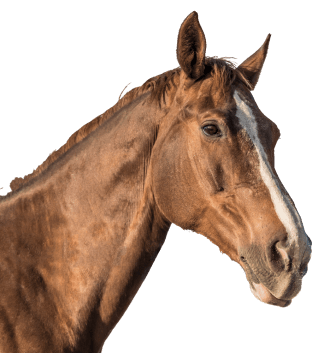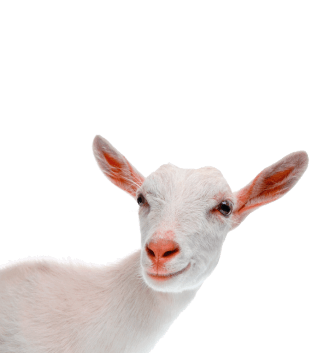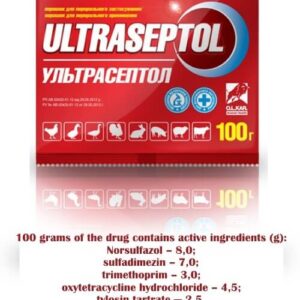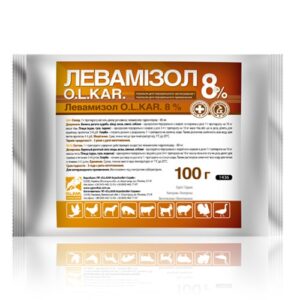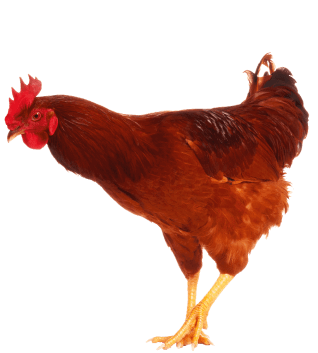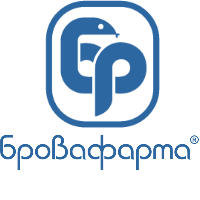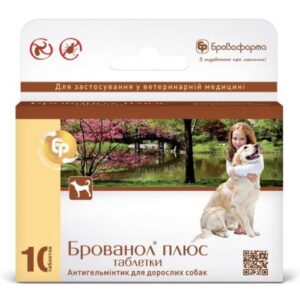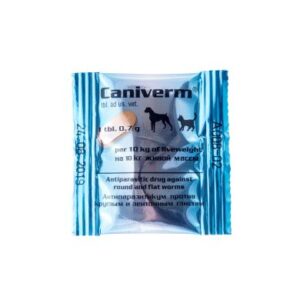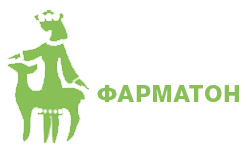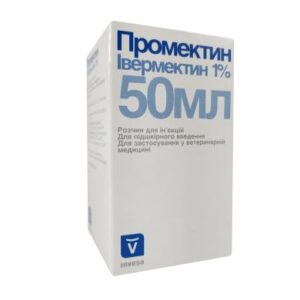Ivermectin 1% Brovermectin solution for injection, 100 ml
Anthelmintic, Antiparasitic, Insecticidal ● For Cattle, Sheep, Goats, Pigs, Horses, Dogs, Rabbits, Turkeys, Chickens
Ivermectin 1% (analog Durvet). Ivermectin refers to a chemical group of macrocyclic lactones. The pharmacological action of the drug is to block neural impulses between interneurons and motor neurons in the ventral excitatory stem parasites, which leads to paralysis and death.
Storage
1 ml of the drug contains:
ivermectin – 10 mg
Description
The liquid is colorless or light yellow, transparent, viscous, without mechanical inclusions, with a faint specific odor.
Pharmacological properties
Ivermectin is a mixture of two semi-synthetic derivatives of avermectins, which belong to macrocyclic lactones. Stimulates the release of the neurotransmitter inhibition of gamma-aminobutyric acid (GABA), blocks the transmission of nerve impulses through the interneurons of the ventral nerve trunk of nematodes and neuromuscular connections of arthropods, causing paralysis and death of parasites.
Indication
Treatment and prevention of animals with endo- and ectoparasites:
- cattle: gastrointestinal tract – larvae and larvae of stage 4 Nematodirus helvetianus, Ostertagia ostertagi, O. lyrata, Bunostomum trigonocephalum, B. phlebotomum, Haemonchus placei (larvae 3 and 4 stages), Trichostrongylus achei, T. colubriis; lungs – mature and larvae of stage 4 Dictyocaulus viviparus; cavities – stages of microsetaries Setaria labiato-papillosa; skin – mature Paraphilaria bovicola, larvae of subcutaneous mosquitoes 1 and 2 stages Hypoderma bovis, H. lineatum, scabies mites Psoroptes bovis, Sarcoptes bovis, Chorioptes bovis, mites Demodex bovis, hairworms Bovicola bovis, lice Haematousus egnys;
- sheep, goats: gastrointestinal tract – mature and larvae of 3rd and 4th stages Bunostomum trigonocephalum, Haemonchus contortus, Ostertagia circumcincta, Oesophagostomum venulosum, O. columbianum, Chabertia ovina, mature Trichostrongylus colicis, Tichostrongylus axéis, lungs – mature and larvae of stage 4 Dictyocaulus filaria, Protostrongylus rufescens; nasopharynx – larval larvae of all stages Oestrus zavis; skin – scabies mites Psoroptes ovis, Sarcoptes bovis, S. caprae, Chorioptes ovis, Ch. caprae, hair follicles Bovicola zavis, B. caprae, lice Linognathus ovillus, L. pedalis, L. caprae;
- pigs: gastrointestinal tract – mature and larvae 4 stages Ascaris suum, Oesophagostomum dentatum, mature Strongyloides ransomi, Trichuris suis; lungs – Metastrongylus spp .; kidneys – mature and larvae of stage 4 Stefanurus dentatus; skin – lice Haematopinus suis, mites Sarcoptes suis, S. parvula, Demodex phylloides;
- horses : gastrointestinal tract – Ascaridae, Strongylidae, Strongyloididae, Oxyurata, Trihonematidae, Spiruridae; lungs – Dictyocaulus spp .; skin – Parafilaria multipapillosa, Onchcerca cervicalis, larvae of Gads – Gasterophilus spp., Rhinoestrus purpureus;
- dogs: Gastrointestinal tract – Toxocara canis, Toxascaris leonina, Ancylostoma caninum, Uncinaria stenocephala; skin – mites Sarcoptes canis, Notoedres cati, Otodectes cynotis, Cheyletiella jasguri, Demodex canis, lice Linognathus setotus;
- rabbits: nematodes Passalurus ambiguus, mites Psoroptes cuniculi;
- poultry (chickens, turkeys): mites Knemidocoptes mutans, K. pilae, K. gallinae.
Contraindication
Do not use in cows during lactation and 28 days before calving, foals under 1 year of age, sport horses, small breed dogs, laying hens and depleted animals of all species. Do not use for puppies under 6 weeks of age, dogs of collies, shelties, bobtails and their crossbreeds.
Method of application and dosage
The drug is used once, only subcutaneously in the shoulder blade, pigs – in the neck. Doses of the drug for different species of animals are listed in the table.
| Animal species | Dose, ml / 10 kg of body weight |
| Cattle, sheep, goats, horses, rabbits | 0.2 |
| Pigs | 0.3 |
| Dogs | 0.2-0.4 |
| Poultry (chickens, turkeys) | 0.1 (per bird); 0.2 (weighing more than 5 kg) |
*Kilograms to a Pounds conversion table
| Kilograms (kg) | Pounds (lb) | Pounds+Ounces (lb+oz) |
| 0.1 kg | 0.220 lb | 0 lb 3.527 oz |
| 1 kg | 2.205 lb | 2 lb 3.274 oz |
| 5 kg | 11.023 lb | 11 lb 0.370 oz |
| 10 kg | 22.046 lb | 22 lb 0.740 oz |
In the treatment of scabies, demodicosis, chorioptosis, the drug is re-administered after 8-10 days. Injection of more than 5 ml is divided into two parts and injected into different places.
Reservation
After the last application of the drug slaughter of animals for meat is allowed in 28 days. Meat obtained before this date is used only for feeding carnivores and making meat and bone meal.
Storage conditions
In a dry, dark place, out of reach of children at a temperature of +8 to +25 ° C.
Expiration date
3 years.




